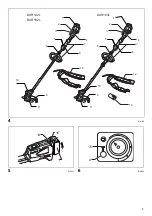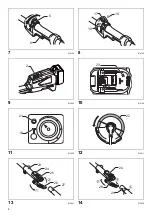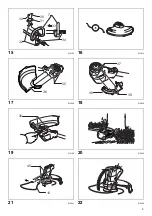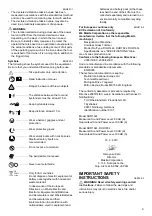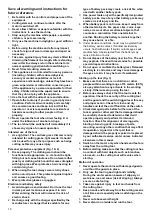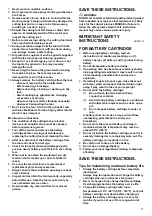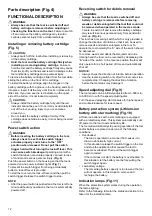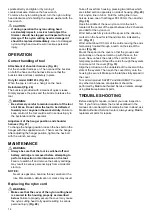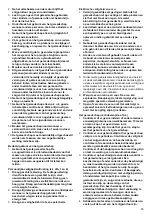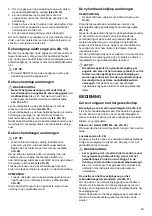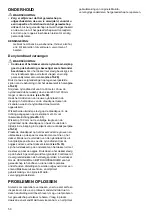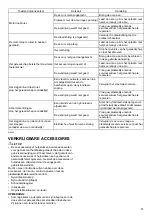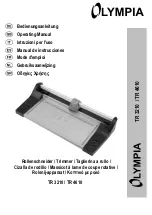
11
7.
Never work on unstable surfaces.
8.
Don’t overreach. Keep proper footing and balance
at all times.
9.
Remove sand, stones, nails etc. found within the
working range. Foreign particles may damage the
cutting tool and can cause to be thrown away,
resulting in a serious injury.
10.
Should the cutting tool hit stones or other hard
objects, immediately switch off the motor and
inspect the cutting tool.
11.
Before commencing cutting, the cutting tool must
have reached full working speed.
12.
During operation always hold the tool with both
hands. Never hold the tool with one hand during
use. Always ensure a safe footing.
13.
All protective equipment such as guards supplied
with the tool must be used during operation.
14.
Except in case of emergency, never drop or cast
the tool to the ground or this may severely
damage the tool.
15.
Never drag the tool on the ground when moving
from place to place, the tool may become
damaged if moved in this manner.
16.
Always remove the battery cartridge from the tool:
-
whenever leaving the tool unattended;
-
before clearing a blockage;
-
before checking, cleaning or working on the
tool;
-
before making any adjustments, changing
accessories or storing;
-
whenever the tool starts vibrating unusually;
-
whenever transporting the tool.
17.
Don’t force the tool. It will do the job better and
with less likelihood of a risk of injury at the rate for
which it was designed.
Maintenance instructions
1.
The condition of the cutting tool, protective
devices and shoulder strap must be checked
before commencing work.
2.
Turn off the motor and remove the battery
cartridge before carrying out maintenance,
replacing the cutting tool and cleaning the tool.
3.
After use, disconnect the battery cartridge from
the tool and check for damage.
4.
Check for loose fasteners and damaged parts
such as nearly halfway cut-off state in the cutting
tool.
5.
When not in use store the equipment in a dry
location that is locked up or out of children’s
reach.
6.
Use only the manufacturer’s recommended
replacement parts and accessories.
7.
Always ensure that ventilation openings are kept
clear of debris.
8.
Inspect and maintain the tool regularly, especially
before/after use. Have the tool repaired only by
our authorized service center.
9.
Keep handles dry, clean and free from oil and
grease.
SAVE THESE INSTRUCTIONS.
WARNING:
DO NOT let comfort or familiarity with product (gained
from repeated use) replace strict adherence to safety
rules for the subject product. MISUSE or failure to
follow the safety rules stated in this instruction
manual may cause serious personal injury.
IMPORTANT SAFETY
INSTRUCTIONS
ENC007-8
FOR BATTERY CARTRIDGE
1.
Before using battery cartridge, read all
instructions and cautionary markings on (1)
battery charger, (2) battery, and (3) product using
battery.
2.
Do not disassemble battery cartridge.
3.
If operating time has become excessively shorter,
stop operating immediately. It may result in a risk
of overheating, possible burns and even an
explosion.
4.
If electrolyte gets into your eyes, rinse them out
with clear water and seek medical attention right
away. It may result in loss of your eyesight.
5.
Do not short the battery cartridge:
(1)
Do not touch the terminals with any
conductive material.
(2)
Avoid storing battery cartridge in a container
with other metal objects such as nails, coins,
etc.
(3)
Do not expose battery cartridge to water or
rain.
A battery short can cause a large current flow,
overheating, possible burns and even a
breakdown.
6.
Do not store the tool and battery cartridge in
locations where the temperature may reach or
exceed 50°C (122°F).
7.
Do not incinerate the battery cartridge even if it is
severely damaged or is completely worn out. The
battery cartridge can explode in a fire.
8.
Be careful not to drop or strike battery.
9.
Do not use a damaged battery.
10.
Follow your local regulations relating to disposal
of battery.
SAVE THESE INSTRUCTIONS.
Tips for maintaining maximum battery life
1.
Charge the battery cartridge before completely
discharged.
Always stop tool operation and charge the battery
cartridge when you notice less tool power.
2.
Never recharge a fully charged battery cartridge.
Overcharging shortens the battery service life.
3.
Charge the battery cartridge with room
temperature at 10°C - 40°C (50°F - 104°F). Let a hot
battery cartridge cool down before charging it.
4.
Charge the battery cartridge once in every six
months if you do not use it for a long period of
time.



